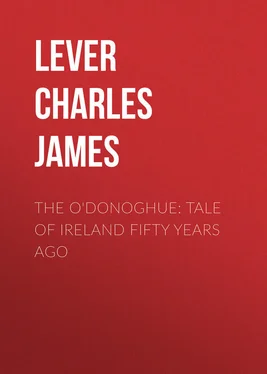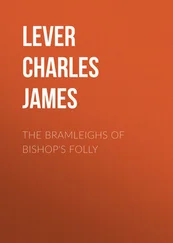Charles Lever - The O'Donoghue - Tale of Ireland Fifty Years Ago
Здесь есть возможность читать онлайн «Charles Lever - The O'Donoghue - Tale of Ireland Fifty Years Ago» — ознакомительный отрывок электронной книги совершенно бесплатно, а после прочтения отрывка купить полную версию. В некоторых случаях можно слушать аудио, скачать через торрент в формате fb2 и присутствует краткое содержание. Издательство: Иностранный паблик, Жанр: literature_19, foreign_antique, foreign_prose, на английском языке. Описание произведения, (предисловие) а так же отзывы посетителей доступны на портале библиотеки ЛибКат.
- Название:The O'Donoghue: Tale of Ireland Fifty Years Ago
- Автор:
- Издательство:Иностранный паблик
- Жанр:
- Год:неизвестен
- ISBN:нет данных
- Рейтинг книги:4 / 5. Голосов: 1
-
Избранное:Добавить в избранное
- Отзывы:
-
Ваша оценка:
- 80
- 1
- 2
- 3
- 4
- 5
The O'Donoghue: Tale of Ireland Fifty Years Ago: краткое содержание, описание и аннотация
Предлагаем к чтению аннотацию, описание, краткое содержание или предисловие (зависит от того, что написал сам автор книги «The O'Donoghue: Tale of Ireland Fifty Years Ago»). Если вы не нашли необходимую информацию о книге — напишите в комментариях, мы постараемся отыскать её.
The O'Donoghue: Tale of Ireland Fifty Years Ago — читать онлайн ознакомительный отрывок
Ниже представлен текст книги, разбитый по страницам. Система сохранения места последней прочитанной страницы, позволяет с удобством читать онлайн бесплатно книгу «The O'Donoghue: Tale of Ireland Fifty Years Ago», без необходимости каждый раз заново искать на чём Вы остановились. Поставьте закладку, и сможете в любой момент перейти на страницу, на которой закончили чтение.
Интервал:
Закладка:
“Well, well, I wonder if Miss Kate will ever come back again,” said she, in a pause.
“To be sure she will,” said Kerry; “what would hinder her? hasn’t she a fine fortune out of the property? ten thousand, I heerd the master say.”
“Ayeh! sure it’s all gone many a day ago; the sorra taste of a brass farthen’s left for her or any one else. The master sould every stick an’ stone in the place, barrin’ the house that’s over us, and sure that’s all as one as sould too. Ah, then, Miss Kate was the purty child, and had the coaxing ways with her.”
“‘Tis a pity to make her a nun,” said Kerry.
“A pity! why would it be a pity, Kerry O’Leary?” said the old lady, bristling up with anger. “Isn’t the nuns happier, and dacenter, and higher nor other women, with rapscallions for husbands, and villians of all kinds for childher? Is it the likes of ye, or the crayture beside ye, that would teach a colleen the way to heaven? Musha, but they have the blessed times of it – fastin’ and prayin’, and doing all manner of penance, and talking over their sins with holy men.”
“Whisht! what’s that? there’s the bell ringing above stairs,” said Kerry, suddenly starting up and listening. “Ay, there it is again,” and, so saying, he yawned and stretched himself, and after several interjectional grumblings over the disturbance, slowly mounted the stairs towards the parlour.
“Are ye sleepin’ down there, ye lazy deevils?” cried Sir Archy from the landing of the stairs. “Did ye no hear the bell?”
“‘Tis now I heerd it,” said Kerry composedly, for he never vouchsafed the same degree of deference to Sir Archy, he yielded to the rest of the family.
“Go see if there be any lemon’s in the house, and lose no time about it.”
“Faix, I needn’t go far then to find out,” whined Kerry; “the master had none for his punch these two nights; they put the little box into a damp corner, and, sure enough, they had beards on them like Jews, the same lemons, when they went to look for them.”
“Go down then to the woman, M’Kelly’s, in the glen, and see if she hae na some there.”
“Oh murther! murther!” muttered Kerry to himself, as the whistling storm reminded him of the dreadful weather without doors. “‘Tis no use in going without the money,” said he slyly, hoping that by this home-thrust he might escape the errand. “Ye maun tell her to put it in the account, man.” “‘Tis in bad company she’d put it then,” muttered Kerry below his breath, then added aloud – “Sorrow one she’d give, if I hadn’t the sixpence in my hand.”
“Canna ye say it’s no’ for yoursel’, it’s for the house – she wad na refuse that.”
“No use in life,” reiterated he solemnly; “she’s a real naygur, and would, not trust Father Luke with a week’s snuff, and he’s dealt there for sneeshin these thirty years.”
“A weel, a weel,” said M’Nab in a low harsh voice; “the world’s growing waur and waur. Ye maun e’en gie her a shilling, and mind ye get nae bad bawbees in change; she suld gie ye twelve for saxpence.”
Kerry took the money without a word in reply; he was foiled in the plan of his own devising, and with many a self-uttered sarcasm on the old Scotchman, he descended the stairs once more.
“Is Master Herbert worse?” said the cook, as the old huntsman entered the kitchen.
“Begorra he must be bad entirely, when ould Archy would give a shilling to cure him. See here, he’s sending me for lemons down to Mary’s.”
Kerry rung the coin upon the table as if to test its genuiness, and muttered to himself —
“‘Tis a good one, devil a lie in it.”
‘"There’s the bell again; musha, how he rings it.”
This time the voice of Sir Archy was heard in loud tones summoning Kerry to his assistance, for Herbert had become suddenly worse, and the old man was unable to prevent him rising from his bed and rushing from the room.
The wild and excited tones of the youth were mixed with the deeper utterings of the old man, who exerted all his efforts to calm and restrain him as Kerry reached the spot. By his aid the boy was conveyed back to his bed, where, exhausted by his own struggles, he lay without speaking or moving for some hours.
It was not difficult to perceive, however, that this state boded more unfavourably than the former one. The violent paroxysms of wild insanity betokened, while they lasted, a degree of vital energy and force, which now seemed totally to have given way; and although Kerry regarded the change as for the better, the more practised and skilful mind of Sir Archibald drew a far different and more dispiriting augury.
Thus passed the weary hours, and at last the long day began to decline, but still no sign, nor sound, proclaimed the doctor’s coming, and M’Nab’s anxiety became hourly more intense.
“If he come na soon,” said he, after a long and dreary silence, “he need na tak’ the trouble to look at him.”
“‘Tis what I’m thinking too.” said Kerry, with a sententious gravity almost revolting – “when the fingers does be going that way, it’s a mighty bad sign. If I seen the hounds working with their toes, I never knew them recover.”
CHAPTER IX. A DOCTOR’S VISIT
The night was far advanced as the doctor arrived at the O’Donoghue’s house, drenched with rain, and fatigued by the badness of the roads, where his gig was often compelled to proceed for above a mile at a foot pace. Doctor Roach was not in the most bland of tempers as he reached his destination; and, of a verity, his was a nature that stood not in any need of increased acerbity. The doctor was a type of a race at one time very general, but now, it is hard to say wherefore, nearly extinct in Ireland. But so it is; the fruits of the earth change not in course of years more strikingly, than the fashions of men’s minds. The habits, popular enough in one generation, survive as eccentricities in another, and are extinct in a third.
There was a pretty general impression in the world, some sixty or seventy years back, that a member of the medical profession, who had attained to any height in his art, had a perfect right to dispense with all the amenities and courtesies which regulate social life among less privileged persons. The concessions now only yielded to a cook, were then extended to a physician; and in accordance with the privilege by which he administered most nauseous doses to the body, he was suffered to extend his dominion, and apply scarcely more palatable remedies to the minds of his patients. As if the ill-flavoured draughts had tinctured the spirit that conceived them, the tone of his thoughts usually smacked of bitters, until at last he seemed to have realized, in his own person, the conflicting agencies of the pharmacopoeia, and was at once acrid, and pungent, and soporific together.
The College of Physicians could never have reproached Doctor Roach with conceding a single iota of their privileges. Never was there one who more stoutly maintained, in his whole practice through life, the blessed immunity of “the Doctor.” The magic word “Recipe,” which headed his prescriptions, suggested a tone of command to all he said, and both his drugs and dicta were swallowed without remonstrance.
It may not be a flattering confession for humanity, but it is assuredly a true one, that the exercise of power, no matter how humble its sphere, or how limited its range, will eventually generate a tyrannical habit in him who wields it. Doctor Roach was certainly not the exception to this rule. The Czar himself was not more autocrat in the steppes of Russia, than was he in any house where sickness had found entrance. From that hour he planted his throne there. All the caprices of age, all the follies of childhood, the accustomed freedoms of home, the indulgences which grow up by habit in a household, had to give way before a monarch more potent than all, “the Doctor.” Men bore the infliction with the same patient endurance they summoned to sustain the malady. They felt it to be grievous and miserable, but they looked forward to a period of relief, and panted for the arrival of the hour, when the disease and the doctor would take their departure together.
Читать дальшеИнтервал:
Закладка:
Похожие книги на «The O'Donoghue: Tale of Ireland Fifty Years Ago»
Представляем Вашему вниманию похожие книги на «The O'Donoghue: Tale of Ireland Fifty Years Ago» списком для выбора. Мы отобрали схожую по названию и смыслу литературу в надежде предоставить читателям больше вариантов отыскать новые, интересные, ещё непрочитанные произведения.
Обсуждение, отзывы о книге «The O'Donoghue: Tale of Ireland Fifty Years Ago» и просто собственные мнения читателей. Оставьте ваши комментарии, напишите, что Вы думаете о произведении, его смысле или главных героях. Укажите что конкретно понравилось, а что нет, и почему Вы так считаете.












